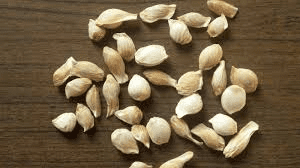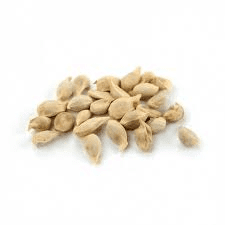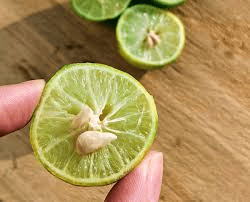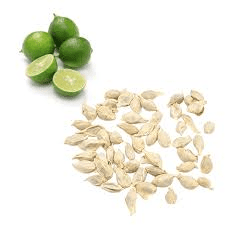Lime seeds are small, oval-shaped structures found at the centre of lime fruits. They play a crucial role in the reproduction and propagation of lime trees, although they are typically not consumed due to their bitter taste and potential toxicity in large quantities.
Each lime fruit contains several seeds, varying in number depending on factors like fruit variety and growing conditions. Lime seeds are surrounded by the juicy pulp and are typically pale yellow to light brown in color. They are encased in a tough, fibrous membrane that protects them within the fruit.
From a botanical perspective, lime seeds are part of the reproductive cycle of the lime tree. When conditions are favorable, such as adequate moisture and warmth, lime seeds can germinate and sprout into new lime trees. This process is essential for the cultivation and propagation of lime trees in agricultural settings.
Culturally and culinarily, lime seeds are generally discarded and not consumed due to their bitter taste and potential toxicity. While small amounts of lime seeds are not harmful, consuming large quantities can lead to digestive discomfort or cyanide poisoning, as they contain compounds that can release cyanogenic glycosides when metabolized.
In culinary practices, lime seeds are removed before using the pulp or juice in recipes. This ensures that the tart and tangy flavor of the lime is enjoyed without any bitter or potentially harmful elements. Lime seeds are also not typically used in gardening or landscaping due to their limited practical use beyond propagation.
Lime seeds are integral to the natural reproductive cycle of lime trees but are not a part of the culinary or medicinal use of limes due to their bitter taste and potential toxicity. They serve primarily as a means of propagating lime trees rather than as a component of human consumption or practical application.
The Economic Importance and Uses of Lime Seeds

1. Agricultural Seedling: Lime seeds are used to grow new lime trees, ensuring the continued production of limes for various industries.
2. Essential Oils: Lime seeds can be processed to extract essential oils, which are used in aromatherapy, cosmetics, and flavoring.
3. Pharmaceuticals: Lime seed extracts contain compounds beneficial for health, used in supplements and medicinal products.
4. Animal Feed: Processed lime seeds are used as a nutritional supplement in animal feed.
5. Biofuel: Lime seeds can be converted into biofuel, providing an alternative energy source.
6. Biodegradable Plastics: The oil from lime seeds is used in the production of biodegradable plastics.
7. Soil Enrichment: Crushed lime seeds are used as a natural fertilizer, enriching soil quality.
8. Insect Repellents: Lime seed oil has natural insect-repelling properties, used in organic farming and household products.
9. Cosmetics: Lime seed oil is used in skincare and hair care products for its moisturizing and antioxidant properties.
10. Culinary Uses: Lime seeds are sometimes ground and used in spice blends for their citrus flavor.
11. Beverage Industry: Extracts from lime seeds are used to flavor certain beverages.
12. Traditional Medicine: Lime seeds are used in various traditional remedies for their health benefits.
13. Soap Making: The oil from lime seeds is used in making natural soaps.
14. Pet Care: Lime seed oil is used in pet shampoos and sprays for its soothing and insect-repelling properties.
15. Nutritional Supplements: Lime seed extracts are included in dietary supplements for their vitamin and mineral content.
16. Health Products: Lime seed oil is used in health products like massage oils and therapeutic balms.
17. Sustainable Packaging: The oil and biomass from lime seeds are used in developing eco-friendly packaging materials.
18. Research and Development: Lime seeds are studied for their potential in new agricultural and pharmaceutical applications.
Read Also: Earthen Pond Management: Steps to take before putting the Fish in the Water
The Products and By-products That Can Be Derived From Lime Seeds

1. Lime Seed Oil: Extracted through cold pressing, used in cosmetics, pharmaceuticals, and cooking.
2. Essential Oils: Distilled from lime seeds for use in aromatherapy and fragrances.
3. Nutritional Supplements: Processed into capsules or powders for dietary supplements.
4. Biofuel: Converted into biofuel through processes like transesterification.
5. Fertilizer: Crushed lime seeds are used as a natural fertilizer.
6. Animal Feed: Ground lime seeds are mixed into animal feed for nutritional benefits.
7. Biodegradable Plastics: The oil from lime seeds is used in making eco-friendly plastics.
8. Insect Repellents: Lime seed oil is used in producing natural insect repellent products.
9. Soaps: The oil from lime seeds is a key ingredient in natural soaps.
10. Skincare Products: Lime seed oil is used in creams, lotions, and serums for its moisturizing properties.
11. Hair Care Products: The oil is included in shampoos and conditioners to nourish hair.
12. Culinary Spice Blends: Ground lime seeds are used in creating spice blends.
13. Beverage Flavoring: Extracts from lime seeds are used to flavor certain beverages.
14. Health Products: Used in making therapeutic oils and balms.
15. Sustainable Packaging: Biomass from lime seeds is used to develop eco-friendly packaging materials.
16. Research Materials: Lime seeds are used in research for developing new agricultural and pharmaceutical products.
17. Traditional Remedies: Processed for use in traditional medicinal preparations.
Read Also: The Quantity of Fingerlings/Juveniles to Start your Fish Farm with
Frequently Asked Questions (FAQs) About Lime Seeds

1. What are lime seeds?
Lime seeds are the seeds found inside lime fruits, which can be used for various purposes including agriculture and oil extraction.
2. Can lime seeds be used to grow new lime trees?
Yes, lime seeds can be planted and cultivated to grow new lime trees.
3. What is lime seed oil used for?
Lime seed oil is used in cosmetics, skincare products, cooking, and as an insect repellent.
4. Are there any health benefits of lime seeds?
Yes, lime seeds contain vitamins, minerals, and antioxidants that are beneficial for health.
5. How are lime seeds used in traditional medicine?
Lime seeds are used in traditional remedies to treat various ailments due to their medicinal properties.
6. Can lime seeds be used in animal feed?
Yes, processed lime seeds are used as a nutritional supplement in animal feed.
7. How is lime seed oil extracted?
Lime seed oil is typically extracted through cold pressing of the seeds.
8. What products can be made from lime seed oil?
Products such as soaps, lotions, shampoos, insect repellents, and biofuels can be made from lime seed oil.
9. Are lime seeds used in the beverage industry?
Yes, extracts from lime seeds are used to flavor certain beverages.
10. How do lime seeds contribute to sustainable practices?
Lime seeds are used in producing biodegradable plastics, biofuels, and eco-friendly packaging, contributing to sustainability.

